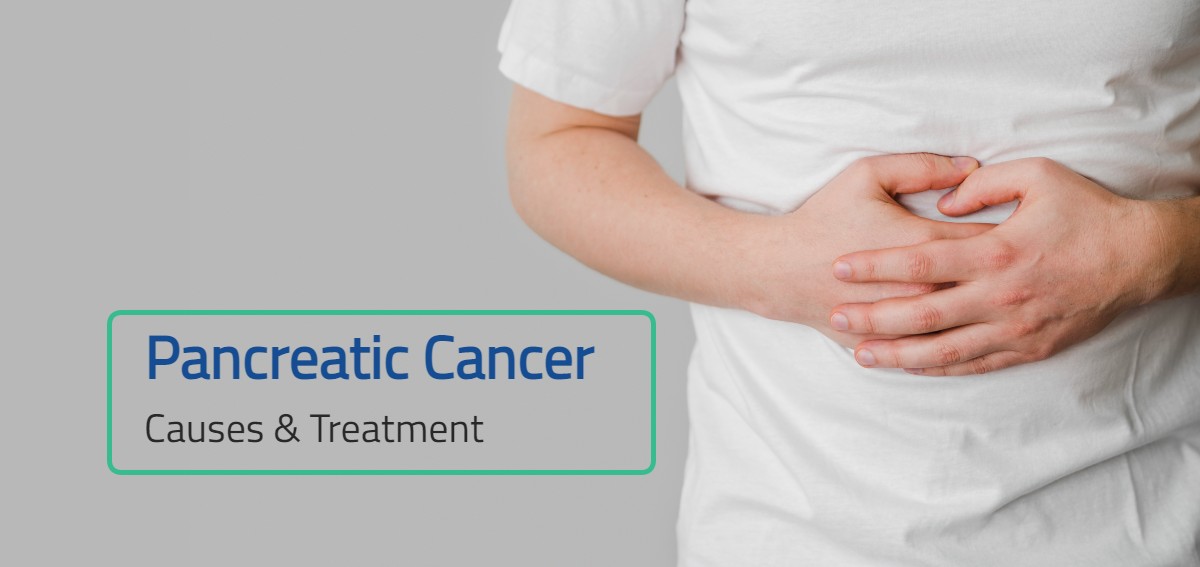Pancreatic cancer is usually developed in the tissues of the pancreas. The pancreas can be affected by various types of tumors, both malignant and noncancerous. The most frequent type of pancreatic cancer starts in the cells lining the duct that transport digestive enzymes from the pancreas (pancreatic ductal adenocarcinoma). Pancreatic cancer is hardly ever identified in the early stages when it is most treatable because it does not show symptoms until it has migrated to other organs.
What is pancreatic cancer?
The pancreas in our body is made up of a head, body, and tail. It contains two main cell types - Exocrine cells that produce digestive enzymes and secrete them into tubes called ducts. The enzyme travelling through ducts empties into the small intestine where digestion takes place. The other type of pancreatic cell is called Endocrine cells which are clustered in two groups known as the islets of Langerhans. These cells produce insulin and glucagon, released into the bloodstream to help control the blood sugar level.
Pancreatic cancer starts as a mutation of pancreatic cells inducing them to grow very quickly and uncontrollably. The mutated cells often clump together to form tumours that interfere with the normal functions of the pancreas. Most pancreatic cancer form in the ducts and are called adenocarcinoma or exocrine tumours. Endocrine tumours that develop from islets of Langerhans are much less common.
What causes pancreatic cancer?
There is no evidence on what causes pancreatic cancer, so it is tough to tell how to prevent it. However, you can improve your health by changing your daily habits. The following suggestions could help you decrease the risk of pancreatic cancer:
- Try to quit usage of tobacco or smoking
- Eat healthily and exercise regularly to maintain a normal weight.
- Drink in moderation or abstain completely from alcohol consumption.
- Try to stay away from diabetes. Manage your blood sugar levels even if you have the condition.
- If your job involves exposure to chemicals remembers to wear protective equipment.
What are the symptoms of pancreatic cancer?
The majority of people do not show early indications of pancreatic cancer. Some may notice the following symptoms as the condition worsen:
- Dry, itchy skin.
- Vomiting and nausea
- Tiredness
- Jaundice
- Anorexia nervosa
- Pale Poop
- Pee that is dark
- Loss of weight
- Blood clots
- Diabetic symptoms that are new or worsening.
- Upper abdominal pain that may move to back
If you have any of these symptoms and have recently developed diabetes or pancreatitis (a painful condition caused by pancreas inflammation), your doctor may suspect pancreatic cancer. Pancreatic neuroendocrine cancer symptoms may differ from those associated with regular pancreatic cancer. This is because some PNETs create excessive amounts of hormones.
How is pancreatic cancer treated?
Pancreatic cancer treatment is divided into two parts, curative and non-curative or palliative. The treatment is determined by several factors, including its stage, overall health, the location of the tumour, and whether cancer has spread beyond the pancreas. There are several treatment options available for pancreatic cancer :
A) Surgical Removal:
Most pancreatic cancers are formed in the head of the pancreas which is removed using a surgery known as the Whipple procedure. In this procedure, the head, distal bile duct, and some of the small intestine are removed. It also involves some reconstructive surgery and takes 3 to 5 hours and typically requires a 7 to 10-day hospital stay. If the tumour is found in the tail of the pancreas, a Distal Pancreatectomy surgery is performed to remove the tumour. In some cases, even the spleen and a few parts of the stomach are also removed. If you are in India then make sure to get the operation done by a best gastroenterologist in Bangalore who is also renowned for surgical achievements with years of experience
B) Chemotherapy:
Following surgery, chemotherapy is performed to help destroy any remaining cancer cells in the body.
C) Radiation:
radiation treatment may also be used to target the remaining cancer cells in the pancreas.
Immunotherapy: Treatment to aid your body in its battle against cancer. Immunotherapy has been mainly ineffective against pancreatic cancer, however, it has helped roughly 1% of people with the disease and a certain genetic mutation.
D) Targeted therapy:
In this procedure, specific proteins or genes that aid cancer growth is targeted. Genetic testing is usually done to see if targeted therapy is good for the patient.
When is the right time for doctor consultation ?
If you have not been diagnosed with pancreatic cancer but are concerned about any symptoms such as jaundice or chronic pain, schedule an appointment at Aster Medcity hospital which offers one of the best cancer treatments in Bangalore.
FAQs:
1) What tests are done to detect pancreatic cancer?
CT and MRI are the usual tests done to detect pancreatic cancer.
2) Why is pancreatic cancer usually found in the later stages?
The presence of cancer is found only in the later stages because the condition does not show any symptoms until it starts to spread.
3) Is pancreatic cancer a genetic disease?
Most cancer is genetic, but the majority of pancreatic cancer is sporadic.
4) Is it possible to have a full recovery from pancreatic cancer?
Yes. It is possible to have a full recovery from pancreatic cancer depending on the individual and the stage of cancer.
5) Can you live without a pancreas?
Patients can live without a pancreas provided they take insulin regularly or they could be diabetic.
The source of information for the FAQs are mentioned below:
https://www.hopkinsmedicine.org/health/conditions-and-diseases/pancreatic-cancer/pancreatic-cancer-experts-answer-10-commonly-asked-questions

